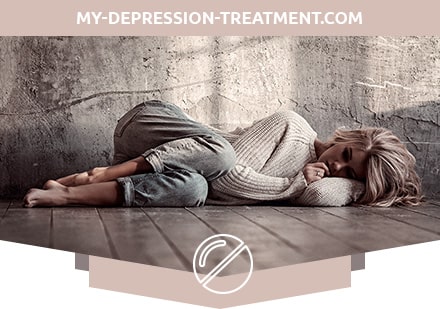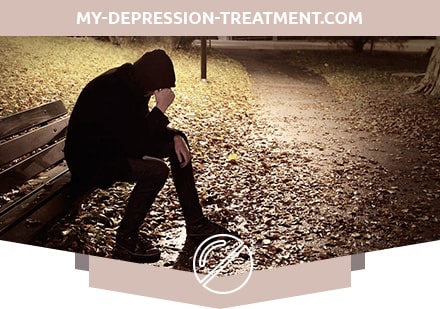
Stages of depression and how can, it be dealt with
Depression can also be referred to as MDD (Major Depressive Disorder). It is a very serious yet a common medical illness that harms how you feel, how you act, and your way of thinking. Depression gives a person the overwhelming feeling of isolation, despair, sadness, and a loss of interest in daily activities that the person might have enjoyed before. This condition interrupts the daily routine of the person and affects the ability to functions properly on the private or professional level.

Many symptoms can identify depression from moderate to severe conditions
- Loss of pleasure or interest in tasks once enjoyed
- Feeling down and having a sad mood
- Changing health – sudden weight gain or loss without any planned diet
- Increased fatigue or loss of energy
- Excessive sleeping or having trouble to fall asleep
- An increase in non-meaningful physical activities, i.e., pacing or hand-wringing or actions that attract attention or is observant by others
- Facing difficulty in concentration, making decisions or even thinking
- Feeling guilty or worthless
- Often thoughts of suicide or death
The symptoms should at least last for about two weeks for them to be diagnosed as Depression. Certain medical conditions such as a brain tumor, vitamins deficiency, or thyroid problems also happen to have similar symptoms of depression, therefore exclude these general medical conditions.
Depression affects approximately 15 adults, i.e. 6.7% at any time of the year or in any year. And every one in six men, women or a conscious human being would experience depression at least once in their life. It strikes at any moment; the reason is not always a single cause yet a process or a collection of failures, heartbreaks, and disappointments. On an average record, late teens and 20 plus women are very likely to suffer from depression than men. Studies show that one-third of adult female experiences a major phase of depression episode once in their life.
How is grief or sadness different from Depression?
A loss of a profession and success job, the death of any person held dearly or loved one or ending a long-lasting relationship are some cases that are very difficult situations for any person to endure. In response to such situations, it is a patently a given for the person to express sadness and grief. Then people end up thinking that due to these losses, they are in depression.
But there is a slight difference between sadness and depression. The sorrow and lament feeling are common and natural yet unique for every independent and may share the same features as depression. Depression and grief both require intense sadness and leads a person to retreat from habitual activities. In many important ways, they are different:
- In the process of grieving, one experiences painful flashbacks of memories or feeling that comes in a flow yet often mixed with a worthwhile and positive impression of the person deceased. While in depression, pleasure, interest, mood, and motivation, one experience none of those for about two weeks the minimum.
- In grief, the person is usually able to maintain his/her self-esteem. In depression, the person feels complete self-loathing and worthlessness.
- For many people, the death of a close one makes them fall into major depression. Physical assault or loss of a job can also lead many people to experience depression. When both grief and depression co-occur, grief becomes even severe and long-lasting than normal grief without depression. However, depression and grief having certain overlap between them, they are not the same. Identifies what the person is going through can help him/her get treatment, help, and support as required.
Types of Depression
Unipolar and Bipolar disorder
In case the predominant characteristic is the depressed mood, this is known as unipolar depression. Nonetheless, if this is featured by both depressive and manic episodes divided by intervals of common mood, this is known as bipolar depression (previously known as manic depression).
The unipolar depression may include anxiety and more symptoms – but not any maniac episodes. Nonetheless, the research marks that around 40 percent of times, people make bipolar disarray are depressed, making both conditions hard to differentiate.
Major depressive disarray with psychotic characteristics
This state is featured by depression followed by psychosis. Psychosis may involve delusions – distance from reality and false beliefs, or hallucinations – feelings things which do not exist.
Postpartum depression
Women mostly encounter “baby blues” with their newborn, but postpartum disorder – also called postnatal depression – tends to be more severe.
Major depressive disarray with seasonal figure
This was previously known as (SAD) seasonally affective disorder; this state is connected to the decreased daylight in winter – depression comes during this time of the year but lifts after this season and in reaction to light treatment. Countries that undergo long severe winters seem to get affected by this condition more.
SAD is trusted to be activated by a disruption in the general circadian rhythm of the human body. Light invading by the eyes affect the rhythm, and some seasonal variation in day/night design may cause a disturbance leading to depression.
Atypical Depression
Have you ever experienced conditions of depression such as excessive sleeping, overeating, or highly sensitive to rejection of any kind, but suddenly you feel yourself perking up while you face any positive event?
- Excessive sleep
- Weakness, fatigue or feeling down
- Excessive weight gain
- Highly reactive and changing of moods
- Intensive reaction or sensitivity to rejection
These symptoms diagnose atypical depression. This is the type of depression that does not follow your thoughts about a typical depressive disorder or normally what happens in a state of depression. Indeed it is very common than its name might implicit. Unlike other types of depression, atypical depression might help one to respond better after certain antidepressant.
Does Depression has risking factors?
Depression can affect anyone, a person that appears to stay in relatively classic circumstances. Multiple factors can perform a role in risking depression. Let us look at some of them as follows.
- Biochemistry
Dissimilarities in specific chemicals inside the brain may play their part as the indication of depression.
- Genetics
Depression may run through families. Such as, if one twin is a victim of depression, there is a 70 percent chance that the other twin will have the same illness in his/her life at some point.
- Life Situations
These involve bereavement, work issues, financial problems, acute stress, relationship with family and friends, divorce, and medical concerns.
- Personality
Those people with less self-respect, who are quickly overwhelmed by tension and stress, or who normally are pessimistic are more likely to go through depression.
- Environmental Factors
Constant exposure to neglect, violence, poverty, or abuse may push some people towards depression.
- Chronic agony syndromes
These, as well as other chronic states, such as cardiovascular disease, diabetes, and chronic pulmonary obstructive disorder, make depression happen more likely.
- Abuse of leisure drugs
Misuse of amphetamines, other drugs, and alcohol are highly connected to depression.
- Prescription Drugs
These involve corticosteroids, interferon, few beta-blockers, and some other drugs that are prescribed.
Childhood trauma or any head injury in the past can be a risk factor too.
You can also face depression when you are about to have a close death surgery, and you are conscious till the moment surgery starts or after any surgery that requires a long-term rest and enables you to perform the minor tasks you take care of daily. In the recovering process, discomfort and pain is a given thing yet to keep yourself emotionally stable is quite a challenge. You might feel anxiety before the surgery; however, after surgery, depression can last depending on the person’s mental strength.

How can it be treated?
Depression stands among the fairly treatable mental disarrays. Within 80 to 90 percent of humans occupied with depression ultimately gives good response to treatments. Almost every patient gets some comfort from their depression symptoms.
Before any treatment or diagnosis, a health specialist must conduct a complete diagnostic evaluation, involving a proper physical examination and possibly an interview. Sometimes, the blood test is done to verify if depression is due or not due to any medical condition such as thyroid problem. An evaluation is to check certain symptoms, family history, and medical history, environmental factors, and cultural factors to come at the diagnosis and suggest a path of action.
Medication
Cerebrum chemistry may factor in the treatment and may give to the individual’s depression. For this cause, patients are given antidepressants to help them change their brain chemistry. Such medications are not ‘uppers,’ tranquilizers or sedatives. They do not form a habit of taking them. Normally antidepressant medications do not have a major or stimulating effect of the patients with no depression.
Between the first week and second week of use, antidepressants may make improvements. But for complete benefits, you have to wait for around two months or three months. In case a patient is unable is feel minor or no improvement at all even after many weeks, then his/her specialist can add another antidepressant or change the dose of the patient’s medication. In some cases, other psychotropic medicines may produce improvement. It is very important to tell your doctor in case a medicine is not working or in case you experience any side effects.
Psychiatrists generally recommend that the patients should continue taking the medicines for around six months or more after the symptoms have started improving. Long-term treatments are recommended to shorten the risk of any future episodes for specific people who are at peak risk.
Psychotherapy
«Talk therapy» or psychotherapy, is at times used just for the treatment of minor depression; for average to acute depression, psychotherapy is mostly used along with the antidepressant medicines. (CBT) Cognitive of behavioral therapy has been discovered to be successful in serving depression. CBT is the type of therapy which is focused on the current and issue solving. CBT lets a human recognize twisted thinking and later change thinking and behaviors.
Psychotherapy may include only a single person, but it can involve others. Such as, couples or family therapy can help mark issues within these near relationships. Patients with similar issues are involved in group therapies. Depending on how severe the depression is, treatment may take some weeks or even longer. In most of the cases, remarkable improvement can be seen in 10 or 15 sessions.
(ECT) Electroconvulsive Therapy: is a medical therapy which is most commonly applied for the patients with bipolar disorders or with major depression who have not been responding to any other treatments. This includes a short electrical stimulation of the patient’s brain as he/she is unconscious due to anesthesia. The patient generally receives ECT two times or three times a week for a whole six or twelve treatments. Since the early 1940s, ECT is used as a therapy for curing depression, and years of proper research have proved major improvements. ECT is generally managed by the team of medical specialist who is trained involving a psychiatrist, a nurse, a physician assistant, or an anesthesiologist.
Exercise and More Therapies
Aerobic exercise can help against minor depression as it raises the levels of endorphin and encourages the neurotransmitter norepinephrine that is connected to mood.
Brain stimulation treatments – includes electroconvulsive treatment – are also utilized in depression. Repeated transcranial magnetic motivation dispatches magnetic pulses to your brain, which may be helpful in severe depressive disorder.
How to provide Self-Help?
There are many things patients can do their self to help them reduce the indications of depression. For most of the people, daily exercise helps in creating positive feels and improve the mood. Getting quality sleep on an everyday basis, avoiding alcohol (any depressant), and eating a good diet can also reduce the indications of depression. Depression is an actual disease, and aid is accessible. With proper treatment and diagnosis, a vast majority of patients with depression can overcome it. The first step to take is to visit a psychiatrist or physician and communicate about your thinking and concerns.
 DE
DE FR
FR IT
IT ES
ES


